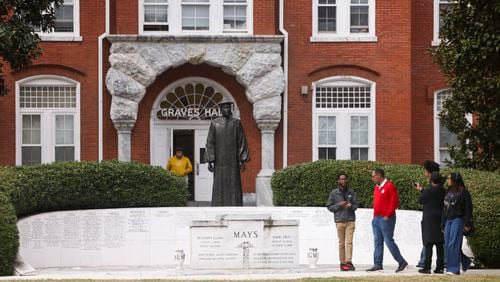Ken Whisenhunt isn’t some up-and-comer. He’s 56. His best days as an NFL head coach came a decade ago, when he took the 9-7 Cardinals to the Super Bowl. The next year, Arizona went 10-6. Those remain his only two winning seasons (of 7-1/2) as a head coach at any level. His career record, counting playoffs, is 52-73.
He has been a very good offensive coordinator for both the Steelers, whom he helped win a Super Bowl, and the Chargers, who will make the playoffs this season. Oh, and he played at Georgia Tech under Bill Curry. (He also played for the Falcons under Dan Henning and Marion Campbell, which is less of a recommendation.) There’s no disputing that Whisenhunt is a good football man. At issue is whether he’d be the right man to coach his alma mater.
Of the 13 other ACC programs, 11 are led by men who had been a collegiate head coach elsewhere. The exceptions are Pittsburgh’s Pat Narduzzi, who was widely considered the nation’s hottest assistant at Michigan State, and Dabo Swinney, who as a 38-year-old recruiting coordinator got the nod when Tommy Bowden was fired. In this Power 5 league, there’s no 21st Century precedent – Dave Wannstedt at Pitt doesn’t count, seeing as how the Panthers were then based in the Big East; Chan Gailey had been head coach at Troy State and Samford before coming to Tech – for handing the job to a career NFL coach and saying, “Good luck with recruiting.”
UCLA tried it with Jim Mora. That lasted six seasons. Nebraska tried with Bill Callahan. That lasted four. Jim Harbaugh coached the 49ers, yes, but before that he was the head coach for San Diego (the college) and Stanford. Lane Kiffin was an assistant at USC before landing with the Raiders. Kiffin’s boss at Troy is the shining – or, given that he left the Trojans in deep-dish NCAA trouble, not-so-shining – exception of a pro coach hitting it big in college, and here we note: USC has considerably more sporting resources than the Georgia Institute of Technology.
The closest parallel would be one of football’s great cautionary tales. Notre Dame hired Charlie Weis, who’d been Bill Belichick’s offensive coordinator with New England and had spent only three long-ago years as a low-level college assistant. Weis arrived saying his Fighting Irish would have “a decided schematic advantage” over their rivals. He went 19-6 his first two seasons – though his biggest “victory” was the epic loss to Carroll’s USC in 2005 – and was rewarded with a 10-year contract extension after working only seven games. (The USC game had been the sixth.)
Weis was fired in 2009. Notre Dame wound up paying him nearly $19 million for not coaching. He alit in Kansas. He went 6-22. His career college record is 41-49.
This isn’t to say Whisenhunt couldn’t succeed where Weis failed. (In football as in life, who the heck ever knows?) It is, however, to say that hiring a guy who hasn’t recruited since 1996 – Whisenhunt spent two years on Vanderbilt’s staff – and handing him a program that didn’t do much in the way of recruiting for 11 years under Paul Johnson would seem an utter misreading of what Tech needs.
In 1996, Nick Saban was entering Year 2 as head coach at Michigan State. In 1996, Urban Meyer was coaching Notre Dame’s receivers. The world of college football has spun round many times since Whisenhunt was part of it. The ACC was a nine-team league back then; it was George O’Leary’s second full season as Tech’s head coach. This will sound harsh, but asking a coach who hasn’t had to pursue teenagers for more than two decades is akin to handing Rip Van Winkle an iPhone and saying, “Hit me up on Snapchat.”
(Belichick, who doesn’t have to recruit, calls social media “SnapFace.”)
We say again: Tech hasn’t been a major player in recruiting for so long that its next man will start three laps behind. He’ll need to hit the ground – forget merely running – making like Carl Lewis on the anchor leg. To illustrate how competitive the ACC has become, we need only note that Florida State didn’t qualify for a bowl and Louisville went 3-9 a year after its 2016 Heisman Trophy winner turned pro.
Put simply, Tech cannot think of its coaching position as an entry-level job. For Whisenhunt on the college level, that’s essentially what it would be. That’s not his fault. His career path has taken him elsewhere. But for Todd Stansbury to anoint someone just because they were teammates back in the day would be a reach of exponential proportions. For all the chatter about this being Whisenhunt’s job to take, I’m not yet sure that’s what will happen.
About the Author






